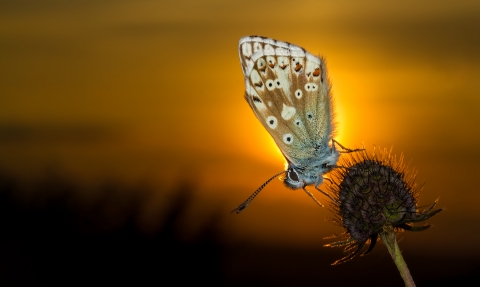
Chalk hill blue butterfly at sunset by Phill Luckhurst /distinctlyaverage.co.uk
Climate change
Our climate is changing
Human-accelerated climate change is an environmental crisis that puts humans and wildlife at risk – and it is happening right now. The world is already 1°C warmer than pre-industrial levels and we are experiencing the impacts, from extreme weather to rising sea levels and diminishing Arctic sea ice.
Without urgent action, global warming is likely to reach 1.5 °C by as soon as 2030. Exceeding this threshold by even half a degree will significantly increase the risk of drought, flood, wildfires, food shortages and poverty for hundreds of millions of people, as well as accelerating biodiversity loss and species extinctions. If the world keeps on warming, we could see catastrophic climate breakdown.
Our planet is a living planet. But these extreme weather events threaten the delicate web of life on which we all depend. There has never been a more urgent time to act.
Why are we facing a climate emergency?

The earth’s climate has always experienced changes over time, but assessments by scientists show that it is extremely likely that human activity is warming our planet at a much faster rate than ever before.
Human use of fossil fuels – coal, oil and natural gas – releases carbon dioxide and other greenhouse gasses into the atmosphere. These gasses trap heat from the sun and warm the planet, causing ice caps to melt and sea levels to rise.
This process has been made worse by other human activities, like deforestation and the degradation of our peatlands and seas. These natural habitats play vital roles in absorbing carbon and regulating our climate. We know that the climate crisis and the biodiversity crisis are intimately linked.
How will climate change affect local wildlife?

Flock of lapwing by Nick Upton/2020VISION
Climate change is a global issue, but already its effects are being felt close to home. While no one weather event can be attributed to climate change, the broad pattern of change for this part of the planet will be for warmer and drier summers, with milder, wetter winters. This year the UK experienced its hottest week on record, and the 10 hottest years on record have all been since 2002. Rising seas are also likely to cause increasingly frequent storms and extreme rainfall events.
These are changes on a large scale. It is hard to give an overview of the impact they will have on wildlife. However, generally it is likely that some, possibly many, species will find it hard to adapt to a changing climate and to the more frequent extreme weather events that climate change will bring. Most species of plant, insect and animal are adapted to thrive in specific habitats and under specific environmental conditions. As climate change causes major changes and fluctuations in these conditions, these species and those that depend on them for food, pollination or shelter are likely to struggle to survive.
Some broad trends we could see include:
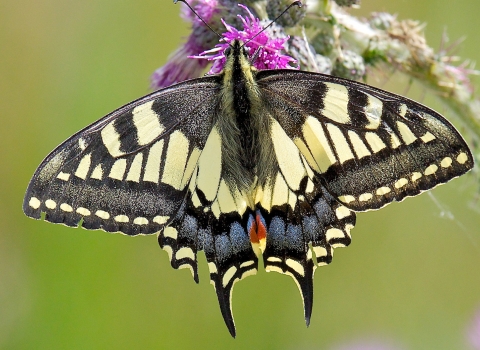
Climate change may see species expanding their range northwards as the climate warms. Swallowtail butterfly photo by David Martin
Changes in wildlife distribution
We are likely to see species from Southern Europe moving northwards. Researchers from Durham University and the RSPB estimate that European Breeding birds will move north by an average of 300 miles. Meanwhile, the areas of habitat suitable for birds adapted to cooler climates are likely to decrease. These changes in distribution could have knock-on consequences as species compete for food and shelter.
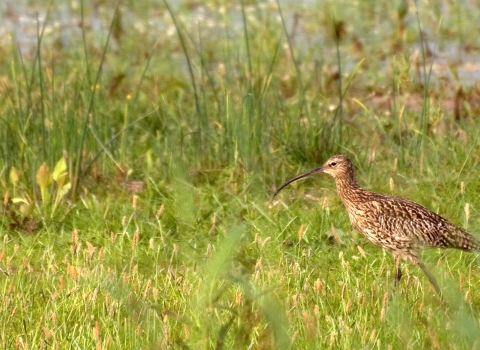
Curlew by Zsuzsanna Bird
Damage to habitats
Lots of our native wildlife has adapted over time to a very specific set of conditions and may be unable to adjust to a changing climate. Wetland birds like redshank and curlew, for example, could decline in number as saltmarshes become inundated with floodwater and wet grasslands dry up during hot summers.
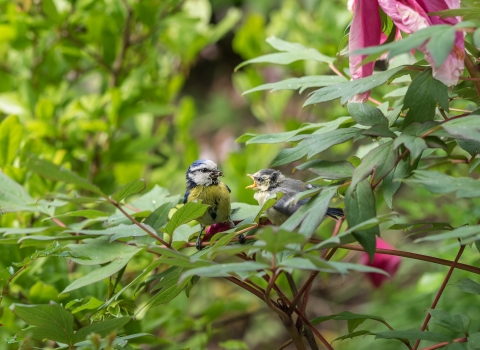
Blue tit feeding young
Lifecycles becoming out of sync
The natural world is a complex web. Changes to the lifecycle of one species can knock another out of balance. For example, blue tit chicks need around 100 caterpillars every day, but if butterflies emerge earlier due to warming temperatures, there may not be enough caterpillars around at the right time for the blue tit chicks to thrive. As this effect ripples through the food web, it could have serious consequences for wildlife.
What impact is climate change going to have on BBOWT’s nature reserves?

Species-rich grassland at Sydlings Copse nature reserve by Colin Williams
Lots of different factors influence the condition of our nature reserves. The impact of climate change on specific nature reserves is also hard to quantify, because there may be some short-term ‘gains’ for certain species and losses for others.
Our nature reserves are likely to remain good places for wildlife to thrive. This is because they are actively managed for wildlife, to create genetically diverse and species-rich habitats which are known to be more resilient to climate change impacts.
However, the mixture of flora and fauna on reserves is likely to change as distribution patterns across the country shift, and some species may become locally extinct as they fail to adapt to the changing conditions.
We monitor the impact of climate change on our nature reserves, and adapt our management of them to best protect the wildlife that calls them home.
What role does BBOWT’s work play in limiting the damage done by the climate crisis?
The natural world is worth protecting in its own right – but a thriving natural environment is also one of the best defences against climate change. From woodlands storing carbon, to floodplains protecting urban areas from floods, the natural world can slow the progress of climate change and protect people and wildlife from its impacts.
To meet the challenge of climate change, we need resilient, abundant, and biodiverse ecosystems across our three counties and beyond.
At BBOWT, we work every day to help protect our natural world, by:
- Protecting our most special wild places, now and for the future – our nature reserves are havens for our remaining wildlife and vital gene pools for future biodiversity.
- Monitoring our nature reserves – we closely monitor the state of our nature reserves and adapt our management approach to respond to the impacts of climate change to ensure they remain good places for wildlife to live and breed.
- Reconnecting people with nature – we bring people closer to wildlife so that they can appreciate how vital a healthy natural world is to everyone’s wellbeing.
- Linking wild places together through our Living Landscapes and community work, we are creating bigger, better and more joined up habitats so that our natural environment can thrive as a buffer against the worst impacts of climate change.
- Welcoming nature back into our towns and cities – we are making our urban spaces greener with projects such as Wild Banbury and Wild Oxford.
- Fighting unsustainable and destructive proposals for new roads and infrastructure – we are not afraid to speak up when the government proposes transport and infrastructure projects that ride roughshod over the natural world.

A shameful step back for nature as UK Government pushes through damaging Planning and Infrastructure Bill
Despite valiant efforts by nature champions in the House of Lords, last night saw the Government bulldoze the wildlife-harming Planning…
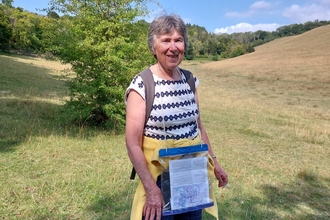
Spotlight on a volunteer
In the next in our series, Joe Humpage chats to Val Siddiqui, BBOWT Volunteer and Wildlife Ambassador about her campaigning for nature…
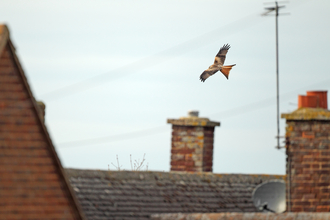
Government’s proposed BNG u-turn will harm nature across Berks, Bucks & Oxon
The Berkshire, Buckinghamshire & Oxfordshire Wildlife Trust (BBOWT) condemns the UK Government’s proposal to weaken Biodiversity Net…
What actions can I take as an individual to reduce my environmental impact?
- Reduce, reuse and recycle – the less you consume, the smaller your carbon footprint
- Meet with or write to your MP and ask them to speak up about climate change
- Avoid single use plastics and choose reusable alternatives
- Go energy efficient – consider switching to a renewable energy supplier, insulate your home and choose A+++ appliances
- Choose locally grown and sourced food where possible
- Eat less meat and ensure the meat that you do it is locally sourced and grass-fed
- Plant a wildlife garden, and grow some of your own food
- Walk, cycle or take public transport instead of driving whenever you can
- Take fewer flights – and particularly short haul flights
- Support the work of the Berks, Bucks and Oxon Wildlife Trust
- Support our Nature Recovery Fund to tackle the climate crisis and bring back nature
Find more tips for helping the planet

How to have an eco-Christmas
Whether you celebrate a big family Christmas, or you just give out a few cards to your friends and neighbours to wish them a happy time…
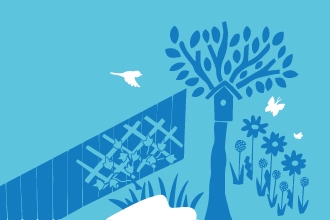
How to start a wildlife garden from scratch
Use the blank canvas of your garden to make a home for wildlife.

How to have a plastic- free Halloween
Halloween is often a great time for spooky family fun, but unfortunately it is often full of plastic.
Find out more
- Global action on climate change - dealing with climate change requires coordinated action by nations around the world.
- UK regulations: the Climate Change Act 2008 – this is the basis for the UK’s approach to tackling and responding to climate change.
- United Nations 6th Environment Outlook Report 2019 - more than 250 scientists and experts from more than 70 countries contributed to the assessment.
- UN Intergovernmental Panel on Climate Change (IPCC) Special Report 2018 - on global warming of 1.5°C
-
UN Intergovernmental Science-Policy Platform on Biodiversity and Ecosystem Services (IPBES) Global Assessment report 2019 - looks at the role the climate crisis has to play in biodiversity decline.

